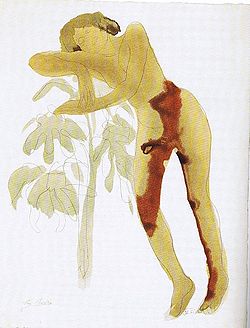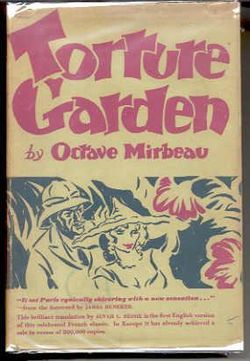.gif)
The Torture Garden (novel)
Encyclopedia
The Torture Garden is a novel written by the French journalist, novelist and playwright Octave Mirbeau
and was first published in 1899
, during the Dreyfus Affair
. The novel is ironically dedicated: "To the priests, the soldiers, the judges, to those people who educate, instruct and govern men, I dedicate these pages of Murder and Blood."
, Mirbeau’s novel is a loosely assembled reworking of texts composed at different eras, featuring different styles, and showcasing different characters. Beginning with material stemming from articles on the 'Law of Murder' discussed in the "Frontispice" ("The Manuscript"), the novel continues with a farcical
critique of French politics as seen in "En Mission" : a French politicians' aide is sent on a pseudo-scientific expedition to China, while his presence at home would be compromising ("The Mission"). Then it moves on to an account of a visit to a Cantonese prison by a narrator accompanied by the sadist/hysteric Clara, who delights in witnessing flayings, crucifixions and numerous tortures, all done in beautifully laid out and groomed gardens, and explaining the beauty of torture to her companion. Finally she attains hysterical orgasm and passes out in exhaustion, only to begin again a few days later ("Le Jardin des supplices", "The Garden").

about the hypocrisy of European 'civilisation' and about the 'Law of Murder'. There is also a denunciation of bloody French and English colonialism
and a ferocious attack on what Mirbeau saw as the corrupt morality of bourgeois capitalist
society and the state
, which he believed were based on murder.
But Mirbeau’s multiple transgressions of the rules of verisimilitude
, his disregard for novelistic convention problematize the issue of the novel’s genre affiliation and leave open the question of the author’s moral message, leaving the readers of today in a state of wonderment, perplexity, and shock.

Octave Mirbeau
Octave Mirbeau was a French journalist, art critic, travel writer, pamphleteer, novelist, and playwright, who achieved celebrity in Europe and great success among the public, while still appealing to the literary and artistic avant-garde...
and was first published in 1899
1899 in literature
The year 1899 in literature involved some significant new books.-Events:*Edgar Rice Burroughs begins working in his father's business.*Rainer Maria Rilke travels to Moscow to meet Leo Tolstoy....
, during the Dreyfus Affair
Dreyfus Affair
The Dreyfus affair was a political scandal that divided France in the 1890s and the early 1900s. It involved the conviction for treason in November 1894 of Captain Alfred Dreyfus, a young French artillery officer of Alsatian Jewish descent...
. The novel is ironically dedicated: "To the priests, the soldiers, the judges, to those people who educate, instruct and govern men, I dedicate these pages of Murder and Blood."
Plot summary
Published at the height of the Dreyfus AffairDreyfus Affair
The Dreyfus affair was a political scandal that divided France in the 1890s and the early 1900s. It involved the conviction for treason in November 1894 of Captain Alfred Dreyfus, a young French artillery officer of Alsatian Jewish descent...
, Mirbeau’s novel is a loosely assembled reworking of texts composed at different eras, featuring different styles, and showcasing different characters. Beginning with material stemming from articles on the 'Law of Murder' discussed in the "Frontispice" ("The Manuscript"), the novel continues with a farcical
Farce
In theatre, a farce is a comedy which aims at entertaining the audience by means of unlikely, extravagant, and improbable situations, disguise and mistaken identity, verbal humour of varying degrees of sophistication, which may include word play, and a fast-paced plot whose speed usually increases,...
critique of French politics as seen in "En Mission" : a French politicians' aide is sent on a pseudo-scientific expedition to China, while his presence at home would be compromising ("The Mission"). Then it moves on to an account of a visit to a Cantonese prison by a narrator accompanied by the sadist/hysteric Clara, who delights in witnessing flayings, crucifixions and numerous tortures, all done in beautifully laid out and groomed gardens, and explaining the beauty of torture to her companion. Finally she attains hysterical orgasm and passes out in exhaustion, only to begin again a few days later ("Le Jardin des supplices", "The Garden").

Commentary
There is an allegoryAllegory
Allegory is a demonstrative form of representation explaining meaning other than the words that are spoken. Allegory communicates its message by means of symbolic figures, actions or symbolic representation...
about the hypocrisy of European 'civilisation' and about the 'Law of Murder'. There is also a denunciation of bloody French and English colonialism
Colonialism
Colonialism is the establishment, maintenance, acquisition and expansion of colonies in one territory by people from another territory. It is a process whereby the metropole claims sovereignty over the colony and the social structure, government, and economics of the colony are changed by...
and a ferocious attack on what Mirbeau saw as the corrupt morality of bourgeois capitalist
Capitalism
Capitalism is an economic system that became dominant in the Western world following the demise of feudalism. There is no consensus on the precise definition nor on how the term should be used as a historical category...
society and the state
State (polity)
A state is an organized political community, living under a government. States may be sovereign and may enjoy a monopoly on the legal initiation of force and are not dependent on, or subject to any other power or state. Many states are federated states which participate in a federal union...
, which he believed were based on murder.
But Mirbeau’s multiple transgressions of the rules of verisimilitude
Verisimilitude
Verisimilitude is the quality of realism in something .-Competing ideas:The problem of verisimilitude is the problem of articulating what it takes for one false theory to be closer to the truth than another false theory...
, his disregard for novelistic convention problematize the issue of the novel’s genre affiliation and leave open the question of the author’s moral message, leaving the readers of today in a state of wonderment, perplexity, and shock.

Quotes
- Woman possesses the cosmic force of an element, an invincible force of destruction, like nature's. She is, in herself alone, all nature! Being the matrix of life, she is by that very fact the matrix of death - since it is from death that life is perpetually reborn, and since to annihilate death would be to kill life at its only fertile source. ~"The Manuscript"
- To take something from a person and keep it for oneself: that is robbery. To take something from one person and then turn it over to another in exchange for as much money as you can get: that is business. Robbery is so much more stupid, since it is satisfied with a single, frequently dangerous profit; whereas in business it can be doubled without danger. ~"The Mission," Chapter 2
- There is only one trait which is irreparable in a statesman: honesty! Honesty is negative and sterile; it is ignorant of the correct evaluation of appetite and ambition - the only powers through which you can found anything durable. ~"The Mission," Chapter 3
- You're obliged to pretend respect for people and institutions you think absurd. You live attached in a cowardly fashion to moral and social conventions you despise, condemn, and know lack all foundation. It is that permanent contradiction between your ideas and desires and all the dead formalities and vain pretenses of your civilization which makes you sad, troubled and unbalanced. In that intolerable conflict you lose all joy of life and all feeling of personality, because at every moment they suppress and restrain and check the free play of your powers. That's the poisoned and mortal wound of the civilized world. ~"The Mission," Chapter 8
- Alas, the gates of life never swing open except upon death, never open except upon the palaces and gardens of death. And the universe appears to me like an immense, inexorable torture-garden. Blood everywhere and, where there is most life, horrible tormentors who dig your flesh, saw your bones, and retract your skin with sinister, joyful faces. ~"The Garden," Chapter 9
- Ah, yes! the Torture Garden! Passions, appetites, greed, hatred, and lies; law, social institutions, justice, love, glory, heroism, and religion: these are its monstrous flowers and its hideous instruments of eternal human suffering. What I saw today, and what I heard, is no more than a symbol to me of the entire earth. I have vainly sought a respite in quietude and repose in death, and I can find them nowhere. ~"The Garden," Chapter 9
External links
- Translation and commentary of the rat torture scene in Le Jardin des supplices.
- Le Jardin des supplices available at Éditions du Boucher
- The Torture Garden .
- Pierre Michel’s foreword.
- Tom McCarthy, Introduction to The Torture Garden.
- Robert Ziegler, "Utopianism and Perversion in Mirbeau's Le Jardin des supplices".

